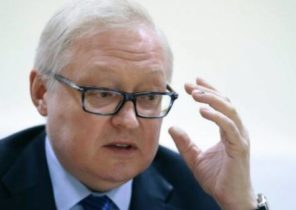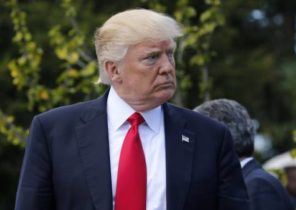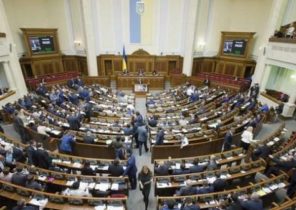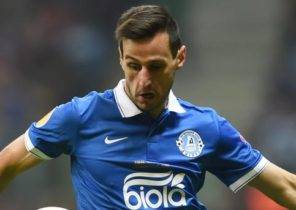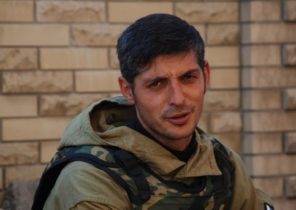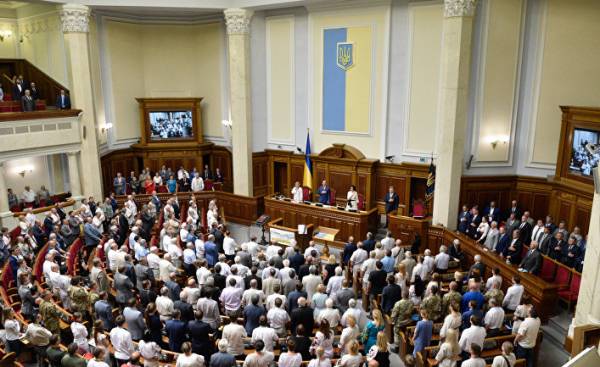
Have we learned to live under the Constitution? Question, do not lose their relevance over many years of Ukraine’s independence. June 28 Main document of the country’s 21 year. Quite a respectable age for a person to reflect on their behavior that they have the right to do and what is prohibited by law. However, in our country is quite a big problem as the culture of observance of the Constitution and its inviolability, as each government is trying to introduce the amendments to the Basic Law. Even now, the President has a Constitutional Commission, which is developing amendments to the Constitution. What’s the problem? Talk with the doctor of political Sciences, people’s Deputy of Ukraine of the IV-VIII convocations, and public figure Mykola Tomenko.
“The rule of law and respect for the rights of the people is what characterized our first big state of Rus ‘-Ukraine”
— How would you describe the traditions of the Ukrainian constitutionalism, given such historical documents as the “Russian truth” of Yaroslav the Wise (XI-XII centuries), the Constitution of Pylyp Orlyk (1710), the relevant documents of the UPR?
— The main characteristics of the Ukrainian constitutionalism is its European character. Moreover, we were not in the context of European tradition — we did. For example, the editors of the “Russian truth” during the children of Yaroslav the Wise introduced the abolition of blood vengeance or replace it with a redemption that even preceded the traditions of many current European countries. That is, we were at the forefront of a civilized approach. In General, care about the rule of law and respect for the rights of the people is what characterized our first big government was said to Mykhailo Hrushevsky, the Rus-Ukraine. If you read the work of Nikolai Kostomarov “Two Russian nationalities”, it clearly shows the difference between Muscovy, where it is not acted nor the right, neither the law nor respect for the person, and Kiev as the capital of the state, where all the representatives of different races and religions feel calm and protected. Therefore, we have formed the European tradition, just at different periods we were torn away from them.
Second position. We always operated in parallel, relatively speaking, on two Constitutions: the philosophical and the legal. For us it was very important in the struggle for independence to formulate the basic philosophical things, consequently everywhere there was a segment where we argued the historical right to self-determination and their own state. All this comes from the Constitution of Pylyp Orlyk to the current Constitution of Ukraine, in which the introductory part and the first section are ideological in nature.
Now — about the type of political regime. Obviously, in all documents, with the possible exception of quasicontinuity the Soviet period and document the underground or the liberation struggle for the Ukrainian state, because there was no democracy, there is an appeal to a democratic type of political regime. Because democracy for the Ukrainians has always been valuable since the middle ages, when, for example, the Prince, going camping, collecting advice, not to mention the Cossack period, etc.
If we talk about the form of government, there are two differences between the Large (Central, Eastern) and Western Ukraine. Ukraine the Dnieper were more parliamentary model — there are different kinds of Cossack or Central boards had broad powers, and their interests were represented by the head. The days of the UPR is a classic example of a parliamentary model, as Hrushevsky was a head of state, but the position he was elected to the legislature. In Western Ukraine more gravitated to a presidential Republic. But the fact remains, today, under any circumstances, Ukrainians believe that the direct election of the President or their right to elect the head of state are almost natural right. It gives me reason to believe that the classic parliamentary model will be very seriously perceived by society, since under this model the President is elected not by the people but a representative body.
Form of the state system. Of course, it is a unitary state. And even today, when Putin and Medvedchuk talking about the Federal system, this is the manipulation and twisting of facts. During Drahomanov or Grushevskogo it was about the Federation as about the evolutionary ideas of an exit of Ukraine from the Russian Empire. When it came to forming their own state, if to analyze Hrushevsky, a history of land in Ukraine had no political power, they had only the powers of self-government. Hrushevsky was thinking about the administrative-territorial division and not on the Federal structure. That is, it has always been about the unitary models with wide local self-government, which was supposed to be a society.
Another point — the role of the army. The key conclusion is the importance of the professional and social protection of the army. The most telling example here is the Constitution of Pylyp Orlyk. It was adopted after the tragic defeat at Poltava in 1709, respectively, it was shown the answer to why, in fact, lost. There was a number of articles on social protection of families whose members are fighting for the Ukrainian state. The historical constitutional experience teaches that the military should be treated with great respect, taking care of their social and ideological protection.
My General conclusion the lessons of the Ukrainian constitutionalism is the Constitution, which all know, respect and fulfill.
“The 1996 Constitution largely written in the historical traditions of the Ukrainian constitutionalism”
So how did we come to writing the Ukrainian Constitution of 1996? Have you managed to combine the traditions of our constitutionalism today independent Ukraine?
— I believe that the 1996 Constitution largely written in the historical traditions of the Ukrainian constitutionalism, considering the European experience. Conventionally this experience I share, as has been said, a great ideological Constitution and the Constitution actually legal. Under the ideological Constitution I understand the ideological things, the Preamble and sections — “General principles,” “Rights, freedoms and duties of man and citizen,” “the Election. Referendum”. No wonder these sections, especially the “General principles” and “Election. Referendum” referred to so that the Parliament can not change 300 votes. Such ideological issues like the unitary character of the state, democratic political regime, the character of the state Ukrainian language, etc., if necessary, changes should be submitted to a national referendum. And other institutional things, such as the ratio of power, Parliament may amend by 300 votes.
In 1996 it was impossible to predict and prescribe what can be conflicts in the power triangle, in particular with regard to such sections as “the Verkhovna Rada of Ukraine”, “President”, “the Cabinet of Ministers of Ukraine. Other bodies of Executive power”, “Justice”. Here I am advocating that these sections may be adjusted through changes to the Constitution, and the amendments to relevant constitutional legislation. The main criticism of the Constitution of 1996 applies to those things that are not spelled out in the basic Law. But it was impossible to register everything to the last detail, for this there are special constitutional laws. In General I am opposed to radical changes of the Constitution relating to fundamental things. If this applies to spot things, such as the abolition of parliamentary immunity or reduce the number of MPs, it does not destroy the structure and ideology of the Constitution.
Assessing long-term constitutional process, which actually lasted nearly six years, from 1990 to 1996, and most importantly the result, I can say that it is positive. The only problem is that every government since Leonid Kuchma has tried to avoid them or to interpret or to reverse the actions of the Constitution.
“The Verkhovna Rada adopted the Constitution of 1996 not because of, but in spite of Kuchma and his entourage”
— Recently, Prime Minister Vladimir Groisman praised second President: “for the development of local self-government in our country did Leonid Danilovich Kuchma. When it the Constitution was adopted, it was adopted the law on local self-government…”. In fact, in Ukraine still there is a myth that, say, thanks to Kuchma, the Constitution was adopted. But is this really so? How was this process?
— As an expert and a scientist, I was an active participant in the discussions during the constitutional process was part of different research groups, has written extensively on the subject, and traveled around the country and campaigned for the exclusion of authoritarian model of the constitutional system, which offered Kuchma and his entourage. Kuchma’s team has developed two versions of the Constitution, which largely was a carbon copy of the Constitution of the Russian Federation, starting with a bicameral Parliament and ending with greater powers for the President, particularly in the formation of local authorities. As they said Dmitry Tabachnik — we need soft authoritarianism during the transitional period. This fashion then was to justify their actions precisely this argument.
The scientific community, some of the deputies, the actual democratic part of the elite was against such a model. And when Kuchma understood that he was not able to hold his own version, he suggested that traditional authoritarian scenario, when the head of state and his entourage write a Constitution and submit it to a referendum. On this occasion, even the decree of the President. However, the Kyiv city Rada immediately spoke out against and encouraged not to carry it because it is unconstitutional. The manger would not be an active position of society, part of people’s deputies, scientists, democratic Constitution would not have been able to vote. In my opinion, Parliament voted that adequate version of the document. It was a symmetrical response team Kuchma.
Of course, in 2004 when I was part of the presidential-parliamentary Republic to parliamentary-presidential form of government, a version of the Basic Law of 1996 was criticized. But at the time of adoption of this Constitution, it was absolutely a progressive, European document. And the Parliament had accepted him not because of, but in spite of Kuchma and his entourage, which lobbied for completely opposite on the text and nature of the Constitution.
“May God grant us to live to that time, not to change the Constitution for a President”
— If you can call changes to the Constitution of 2004, which the constitutional Court overturned in 2010, and Parliament was restored in 2014, correct and positive for the country?
— If to speak about the ideology of the Constitution, in a conceptual sense, there is no harm. It is clear that, on the one hand, it was the search for the optimal mechanism balances, and on the other there was a struggle in terms of increase/decrease power. It was a compromise with the ruling before the top of the Kuchma — Yanukovych — Medvedchuk to power peacefully passed to Viktor Yushchenko and his team. Thus the old tip then actually weakened the institution of the President and strengthen the Parliament and the government.
In the period of Yanukovych’s presidency it was clear that, as a supporter of reducing the powers of the President in 2004 because he was unable to hold this position, then, as a head of state, he will regain the powers which, in fact, there is absolutely unconstitutional manner in 2010 After Euromaidan again change 2004 These historical and political circumstances had not only subjective, but also objective, when the company, reacting to specific political period, for example the usurpation of power by Yanukovych, has indicated that the President’s power should be limited.
Another thing, when this Parliament supported changes to the Constitution in terms of justice and did the President in fact the head of the judicial system for a transitional period. This is unacceptable. I do object to write something in the transitional provisions. We know that and the special status of Donbass wanted to prescribe in the transitional provisions. It’s all Kuchma story. At the time, transitional provisions were written under Kuchma, now they write under Petro Poroshenko. So may God grant us to live to that time, not to change the Constitution for a President, and that she was a constant constant in the organization of the legal state and we talked more about respect for the Constitution than on changing it.
“Society is important to achieve the abolition of the unconstitutional laws of the period of Yanukovych”
— What, in fact, is the reason that every President creates a Board or Assembly and trying to amend the Constitution — they want more power?
Due to the fact that everyone is trying to persist longer in power. This tradition, again, began with Kuchma. He started to think about how to stay in power, that is, for a third term. For this, the constitutional Court is absolutely illegal and shameful by decided that, say, the second term of Kuchma was the first, and therefore he had the right to stand for election. In that situation, very actively behaved in public, some of the deputies, not allowing a negative scenario. Then Kuchma and his entourage conceived of another way — started to search for the model of a parliamentary Republic (the promoter was Viktor Medvedchuk) to ensure that in case of impossibility to be elected President Kuchma was able to become Prime Minister with strong powers. This Russian model — we all remember the rotation of Putin and Medvedev. But they failed, so subsequently through said compromise during the orange events they still managed to push through changes with the weakening of presidential powers (parliamentary-presidential form of government).
Then at the time of Yanukovych changes are also thought to gain a foothold at least two terms. And actually, today, when fantastically unpopular “popular front” proposed a very popular President to somehow change the Constitution so much longer to stay in power, it is one of a number of events. I wouldn’t be surprised if Constitution Day or independence Day, the President will take the initiative to amend the Constitution in a referendum.
By the way, let me remind you that we have still not cancelled the Law “On national referendum” the time of Yanukovych, which is a direct flagrant violation of the Constitution. It involves the ability to bypass Parliament and of the expert scientific community to change the constitutional laws or to adopt a new Constitution, which directly contradicts section XIII of the Basic Law. At the time, the current rulers of the state, especially the leaders of the “BPP” and representatives of “NF” when he was in opposition, filed to the constitutional Court a proposal to declare this law unconstitutional, was appealed to the European institutions, which said it was an unconstitutional law, but today, being in power, the President and his team are doing everything to the COP has not considered this decision, Parliament adopted a new Law “On national referendum”. Thus, a dictatorial tool of the Yanukovych remains valid. And I do not exclude that the government wants to use it.
Therefore, for the society, especially on the eve of Constitution Day, it is important to seek the abolition of the unconstitutional laws of Yanukovych. Among them the Law “On national referendum”, law on the so-called regional languages in the Kivalov-Kolesnichenko… it is important to bring the legislation into conformity with the Constitution and the practice of life, and then to think that we need to improve.
“While the Constitution is not an element of responsibility, a citizen will not become law-abiding”
— In 2014, returned to action changed the Constitution in edition of 2004, but can we say that today we in fact live in a parliamentary-presidential Republic?
— I would even say that we are in fact a presidential model. In fact we are talking about what the President’s party “Block of Petro Poroshenko” in cooperation with “the popular front” has built a power vertical in the country. What kind of parliamentary-presidential model can say, if before a key vote in the Verkhovna Rada faction leaders are going in the presidential Administration? Once we were laughed at, when this happened in the days of Kuchma-Medvedchuk. I believe that there is absolute disregard for the Constitution, when the head of the Parliament and heads of factions in the night go to the President and listen how to vote or not to vote for certain laws. This is unacceptable. The constitutional paradox in Ukraine is that the nature and organization of power and the political regime in practice do not correspond to the spirit and letter of the Constitution. And this is the main conclusion on the eve of the Constitution Day.
— In General, with regard to the country, society, is there any progress in the implementation of the Constitution? The British, for example, has 800 years of living on the great Charter of liberties, which, in essence, is not a Constitution, but the Law above all else.
Unfortunately, the culture of confession in the Constitution of society is also low. Why? Because if the President, the head of the Verkhovna Rada, people’s deputies, Ministers, all the officials say that the Constitution is flawed and needs to change, it means that heads of state don’t want to do it, like, when we change, then we will perform. In such a situation, there is society? It also says that the law we won’t run, because the government itself proves that it is bad. There is a fashion when all attorneys and lawyers are thinking about how to get around, not to comply with the law. This anti-legal mentality of a great evil, so just return to legal thinking can change the situation. The process needs to move from both sides. In many countries, especially from the former Soviet Union, in order to obtain citizenship you need to pass the exam on the history, language and the Constitution. So while we have a Constitution is not an element of civil conscience and responsibility, a citizen will not become law-abiding.
